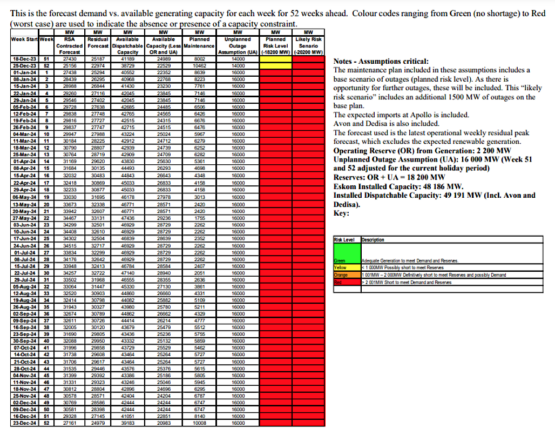The 31 January deadline for government to exclude key public institutions from load shedding seems to be up in the air following an application by Eskom for leave to appeal the ruling of the Gauteng Division of the High Court on 1 December last year.
The court issued a finding of unconstitutional conduct by government over almost three decades that culminated in the current electricity crisis and severe load shedding.
ADVERTISEMENT
CONTINUE READING BELOW
Read:
It ordered Electricity Minister Kgosientsho Ramokgopa to take “all reasonable steps by no later than 31 January 2024, whether in conjunction with Eskom and other organs of state or not,” to ensure uninterrupted power supply to all public hospitals, clinics and schools, as well as police stations, by the end of January.
Presidential spokesperson Vincent Magwenya said “the judgment will be appealed, and Eskom has already lodged its application for leave to appeal”.
Government ‘not contesting its obligation’
Late on Tuesday night Electricity Ministry spokesperson Tsakane Khambane confirmed that “government, with the Ministry of Electricity being a respondent, has filed for leave to appeal in the DA judgment delivered on 1 December”.
“As per its original position and submission in court documents; government is not contesting its obligation to render public services, including a reliable and affordable supply of electricity – but is challenging the ruling on the basis of its legal competence,” she said.
“Government is continuing to act on all measures set out in the five outcomes of the energy action plan to fast-track work to ensure the reduction of the frequency and intensity of load shedding to the general populous, including public facilities like schools, clinics and police stations; with the ultimate objective of ensuring energy security, including a reserve margin to buffer during times of peak demand.”
Read:
Government’s ‘uncertain’ energy crisis plan called out by high court [May 2023]
Secret cabinet report confirms government’s unconstitutional conduct [Dec 2023]
This comes after unprecedented intense load shedding in 2023. After 18 days of no load shedding due to lower demand over the holiday period, the rolling blackouts resumed on Tuesday (2 January).
Bleak outlook until next December
The latest forecast by Eskom’s system operator indicates an equally difficult 2024.
Source: Eskom’s 52-week system status report, Week 50, 2023
An application for leave to appeal normally suspends any court order, which means the police stations, public schools, hospitals and clinics can for the time being not rely on load shedding relief on the basis of the court order.
ADVERTISEMENT
CONTINUE READING BELOW
This has ActionSA, one of the original applicants, fuming.
Party president Herman Mashaba said in a statement: “Instead of addressing the concerns raised by the court ruling – including that load shedding infringes on the basic constitutional rights of South Africans – and protecting the most vulnerable against the power crisis through exempting schools, police stations and hospitals, the president, the minister and Eskom, have rather decided to spend taxpayers’ money to appeal the ruling.”
Eskom expects to win
In its papers, Eskom says its appeal has a reasonable prospect of success for various reasons:
- The order is vague because it does not identify the relevant “respondent organs of state” or prescribe what constitutes “reasonable steps.”
- Eskom argues that it was mistakenly included as being responsible for the electricity crisis, because it was not responsible for any of the [stated] government conduct that resulted in the electricity crisis and was declared to be unconstitutional. By deferring maintenance to its generation fleet, it avoided load shedding at the time. “Whatever Eskom’s decision, therefore, power supply would likely have been interrupted.”
- The utility raises technical arguments that the court overstepped [its mandate] by including certain elements in the order that were not applied for, including the exemptions for schools, police stations and hospitals.
- The government respondents did not get the opportunity to address the court on these exemptions. If the order means they should be exempted from load shedding, it will unlawfully contravene the load shedding rules in the NRS048-9: 2019 Code of Practice and put the national grid at risk of countrywide collapse. If the order requires the minister to provide alternative sources of energy, it will take years to implement and the court did not indicate where the money for doing so would come from. Eskom says “neither the minister of electricity, nor Eskom, can compel national treasury to provide the funding necessary to procure the alternative sources of supply, and the order imposes no obligation on national treasury to make such funds available”.
Eskom states that the judgment is of national importance “and sets a significant precedent regarding duties upon organs of state in relation to the provision of electricity in the context of load shedding, and the ability of a court to interfere with those roles and grant extensive relief that trenches upon separation of powers”.
“A vague and unworkable order is always of concern as it undermines the rule of law, but particularly so in regard to the subject-areas in this case, where organs of state must now seek to comply with the order without clarity about its real impact or reach, and at risk of contempt of court,” it adds.
“Finally, and undoubtedly, the questions in this case were complex ones. The issues in the matter are questions of constitutional interpretation and remedies, of national importance, well suited for appeal court consideration at the Supreme Court of Appeal.”
Read/listen:
Eskom’s distress lucrative for saboteurs but devastating SA economy
Transnet, Eskom crises cause SA economy to miss the boat

